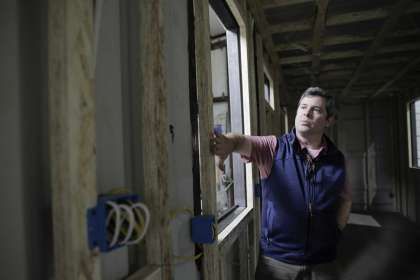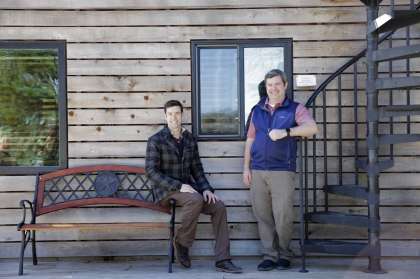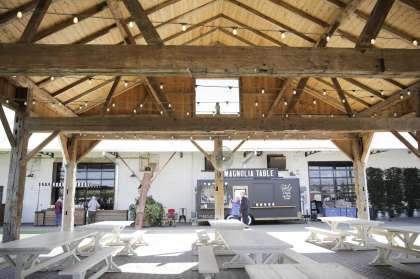Business
WACO — Waco’s most famous destination is a former cotton oil mill reimagined as a home-decor store. The unusual set up is part of the allure. Chip and Joanna Gaines, who oversaw the conversion, are famous for transforming old homes into places that feel one-of-a-kind, and an estimated 50,000 visitors a week from around the world travel to see, first hand, the example of their handiwork: proof that unique design can turn a building into a destination.
Waco residents Kenneth Wheeler and his son, Amos Wheeler — who have worked with the Gaineses more than once — have taken the lesson to heart. They, too, fashion homes that exude a combination of minimalism and homeyness, with shiplap aplenty, as well as a twist: all of their homes are miniature, made of shipping containers the size of a hotel room. Just like hotel rooms, most are for rent.
On HoustonChronicle.com: At less than 400 square feet, tiny homes are gaining popularity
Unlike hotel rooms, however, the tiny home rental business is booming during the era of social distance, a pandemic-proof investment during a period that has put traditional hotels deep in the red. A quirky rental that combines the affordability of a hotel room with a distance from neighbors associated with a cabin or single-family home has become a destination in itself this pandemic.
Even before COVID, tiny homes — and the Wheelers’ tiny homes in particular — were catching the eyes of travelers like the ones flocking to the former mill. In a report released in February, Airbnb announced one of the double-decker container homes built and managed by the family’s companies was among the Top 5 wish-listed tiny houses in the world. Bookings for tiny homes in general were already up 85 percent in 2020 compared to the year before, said Airbnb.
“With sustainable travel in focus, more travelers are taking the minimalist approach when it comes to planning their getaways this year,” the report said. “More than half of Americans would like to spend their money taking a long weekend trip, and more guests are also exploring destinations by car, with searches for listings with free parking up 46 percent.”
Then came the novel coronavirus.

On March 11, Chip Gaines announced that Spring at the Silos — a three-day fair nicknamed the Silobration, which typically attracts 50,000 people and was scheduled for the following weekend — had been canceled. Kenneth Wheeler’s stomach sank when he received the news. He had a feeling of what was coming.
Sure enough, notifications began pouring in as hundreds of scheduled guests suddenly wanted to know whether they could refund their bookings or reschedule for a later date. Soon after, Baylor University said it would have remote classes, Waco issued an order asking residents to stay at home except for essential activities and the state issued what many called a stay-at-home order, requiring Texans to minimize in-person contact.
“The reasons people were traveling canceled,” Kenneth Wheeler said.
Paying for themselves
The Wheelers run two companies, CargoHome, which builds tiny homes that it sells to investors who use them as rentals and to folks who use them as getaway homes, and VillaStay, which manages the rentals. Many of the people who own the rentals that VillaStay was managing are first-time investors or people who were originally thinking about living in the tiny homes themselves, Wheeler said.
What many were attracted to as a relatively inexpensive way to live turned out to be relatively inexpensive way to invest as well. An 8-foot by 20-foot home with shiplap interiors and a rooftop deck can start at $45,900. From there, the options become larger and more elaborate, culminating with a two-story tiny home made of stacked shipping containers and wooden siding, which goes for upwards of $100,000.
On HoustonChronicle.com: Thousands of hotels facing foreclosure as pandemic persists

While a tiny home is inexpensive compared to a traditional home, they are much harder to finance. Lenders usually have a minimum loan amount for a mortgage, and other types of loans mean higher interest rates and shorter terms. Then you have to find a place where local restrictions will allow you to put the thing and figure out the water and electric connections.
The Wheelers solved the problem by providing financing. After CargoHome builds a home, VillaStay can place it in a location it has prepared and rent it until the profits pay it off — usually within a span of seven to 15 years at an interest rate of 5 percent to 6 percent. Investors put down around $6,900 as a downpayment on the basic unit and pay $425 a month for a 10-year loan. Larger units sell for as much as $100,000, with around a $15,000 downpayment and payments of $695 a month for 15-year loan.
The typical rent starts around $70 to $90 a night and can reach as much as $250 a night during a holiday weekend. Most of the 30 rentals built by CargoHome and managed by VillaStay had been fully booked before the pandemic, according to Wheeler, which meant that after paying property management commissions and cleaning fees, owners of the tiny homes took home $1,200 to $2,400 a month, depending on the unit’s size and occupancy rate. Owners paying down loans generally netted more than $700 a month.
Chris Shim was one of the buyers drawn in by the arrangement. An analyst at a hospitality company, Shim and two partners had been looking into ways to invest in real estate when they came across CargoHomes on Instagram. At the end of 2019, they purchased three of the homes, which were listed as short-term rentals online at the end of February.
A few weeks later, as the pandemic caused cancellations to pour in, worries went through his mind. How long would the situation last? Would demand come back?
Sudden turnaround
The last two weeks of March were quiet. Then something curious happened. The first weekend of April, VillaStay bookings rose back to 70 percent occupancy. Hotels nationwide, for contrast, were still 80 percent empty that weekend, according to the hotel industry data company STR.
“You can imagine we were pretty excited,” Wheeler said. “But we said, ‘Maybe this is some strange fluke.’”
The following weekend, they reached 100 percent occupancy across their listings, according to Wheeler. And there was a trend among the guests: They were driving in from nearby cities, mostly Houston and Dallas.
On HoustonChronicle.com: Texans flock to recreation areas as parks reopen

Shim declined to discuss the specifics of his obligations on the rentals, but said they have made a profit every month throughout the crisis. “We find ourselves fortunate,” he said. “We’re very thankful that our numbers are better than you see in traditional hotels.”
It turned out curated, semi-rural getaways were in demand during the pandemic.
During a very difficult time for commercial real estate — so bad that roughly a quarter of hotels are behind on their mortgage payments, according to the Mortgage Bankers Association — VillaStay has plans to expand.
Expansion is already underway in Fredericksburg, which has a history of tiny homes. Since the 1800s, farmers and ranchers built homes as small as 300 square feet in the Hill Country town, where they would spend the weekend in order to be close to a church on Sunday — the homes are known as Sunday houses. Many have since had long and successful runs as short-term rentals, and a number of companies have invested in building new tiny home rentals throughout the Hill Country. After Fredericksburg, VillaStay plans to move into Houston and Austin.
CargoHome also has plans to expand — according to Wheeler, a large hotel developer is looking to put container home resorts under its brand in several locations around the country.
“That’s because hotels are realizing there is a shift: People who are interested in staying in a private unit, but don’t want to rent a whole house.” A homey, Instagrammable, farmhouse-modern shipping container may be just the thing.
Just as the pandemic has led families to move from apartments and condos into single-family homes, Wheeler has seen people who would usually opt for a hotel room choose to stay in a stand-alone tiny house. He can track the number of customers with newly created Airbnb or HomeAway accounts to approximate how many guests are staying in a short-term rental for the first time; that number has increased 30 percent since the pandemic.
“They tell us, this is the first time I’ve ever done this,” he said, “but it seems like the way to travel now.”
rebecca.schuetz@chron.com;
twitter.com/raschuetz




